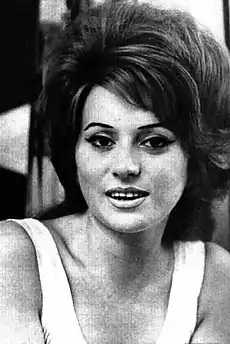
Miranda Martino (born 29 October 1933) is an Italian singer and actress.
Life and career
Born in Moggio Udinese from Neapolitan parents, Martino started her career as singer in 1956.[1] In 1957, she debuted at the Festival di Napoli and in 1959 she made her first appearance at the Sanremo Music Festival, with the song "La vita mi ha dato solo te".[1] In the same year she obtained her first commercial success with the song "Stasera tornerò",[1] which ranked 11 in the Italian Hit Parade.[2] Then she entered the two following editions of the Festival di Sanremo and in 1961 three of her songs entered the Top Ten ("Erano nuvole", "Frenesia" and "Serenatella c'o sì e c'o no").[2] In 1963 she obtained a critical and commercial success with the album Napoli, in which she covered twelve canzoni napoletane re-arranged by Ennio Morricone.[1] In 1965, she made her theatrical debut and from then she focused her career on stage acting and, less prolifically, on films.[1]
Discography
- Albums
- 1958: Magic Moments At La Capannina di Franceschi
- 1959: 20 canzoni di Sanremo '59 (with Nilla Pizzi and Teddy Reno)
- 1959: Miranda Martino
- 1959: Napoli '59. Le 20 canzoni del festival (with Nilla Pizzi, Elio Mauro, Stella Dizzy and Teddy Reno)
- 1959: Il mio vero amore (EP)
- 1962: Miranda Martino
- 1963: Napoli
- 1964: Le canzoni di sempre
- 1966: Napoli volume II°
- 1967: Operetta primo amore
- 1970: Donna...Amore...Dolore
- 1971: Passione...
- 1977: Ottimo Stato
- 1977: La Valzerite
- 2000: Napoli mia bella Napoli
Filmography
- La duchessa di Santa Lucia (Roberto Bianchi Montero, 1959)
- Avventura al motel (Renato Polselli, 1963)
- Canzoni in... bikini (Giuseppe Vari, 1963)
- Sedotti e bidonati (Giorgio Bianchi, 1964)
- Last Plane to Baalbek (Marcello Giannini & Hugo Fregonese, 1965)
- Addio mamma (Irving Jacobs, 1967)
- Paolo Barca, Schoolteacher and Weekend Nudist (Flavio Mogherini, 1975)
- Gegè Bellavita (Pasquale Festa Campanile, 1979)
- A Strange Passion (Jean-Pierre Dougnac, 1984)
- Red American (Alessandro D'Alatri, 1991)
- Dio c'è (Alfredo Arciero, 1998)
- Teste di cocco (Ugo Fabrizio Giordani, 1999)